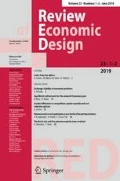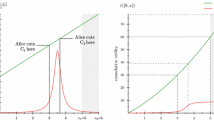Abstract
We investigate the strategy-proof provision and financing of indivisible club good facilities when individuals are subject to congestion costs that are non-decreasing in the number of other club members and in a private type parameter. An allocation rule specifies how the individuals are to be partitioned into clubs and how the costs of the facilities are to be shared by club members as a function of the types. We show that some combinations of our axioms are incompatible when congestion costs are continuous and strictly increasing in the type parameter, but that all of them are compatible if congestion costs are dichotomous and there is equal cost sharing. We present a number of examples of allocation rules with equal cost sharing and determine which of our axioms they satisfy when the congestion cost is linear in the type parameter. We also show that using iterative voting on ascending size to determine a club partition is not, in general, strategy-proof when each facility’s cost is shared equally.
Similar content being viewed by others
Notes
An introduction to the literature on club goods and local public goods may be found in Cornes and Sandler (1996).
Whether an allocation rule is Pareto optimal or nondictatorial depends on which allocations are feasible.
Not joining any club is not an option in our model.
For a survey, see Bloch and Dutta (2011).
In the proofs of Theorems 2 and 3, continuity and strict increasingness (rather than weak increasingness) of f in the type parameter are only used to show the existence of an \({\hat{\alpha }}_1 \in (0, a^*)\) for which \(1/2< f({\hat{\alpha }}_1, 1) < 1\). This is not possible with dichotomous congestion costs.
When \(A(\alpha ) \in {\mathscr {A}}^E\) for all \(\alpha \in {\mathbb {R}}^n_+\), it follows that (i) if an allocation rule satisfies Pareto Optimality, it also satisfies Pareto Optimality on \({\mathscr {A}}^E\) and (ii) if it satisfies Nondictatorship on \({\mathscr {A}}^E\), it also satisfies Nondictatorship.
Our arguments can be adapted to apply to larger values of n.
There is no explicit cost sharing rule. Cost sharing is implicit in the preferences over club size.
For a discussion of this algorithm, see Long (2019).
We are indebted to a referee for the observations made in this paragraph.
References
Bloch F, Dutta B (2011) Formation of networks and coalitions. In: Benhabib J, Jackson MO, Bisin A (eds) Handbook of social economics, vol 1A. North-Holland, San Diego, pp 729–779
Bogomolnaia A, Jackson MO (2002) The stability of hedonic coalition structures. Games Econ Behav 38:201–230
Bogomolnaia A, Nicolò A (2005) Stable assignment of public facilities under congestion. J Public Econ Theory 7:65–91
Buchanan JM (1965) An economic theory of clubs. Economica 32:1–14
Cornes R, Sandler T (1996) The theory of externalities, public goods, and club goods, 2nd edn. Cambridge University Press, Cambridge
Darmann A (2019) Manipulability in a group activity selection problem. Soc Choice Welf 52:527–557
Hardin G (1968) The tragedy of the commons. Science 162:1243–1248
Jackson MO, Nicolò A (2004) The strategy-proof provision of public goods under congestion and crowding preferences. J Econ Theory 115:278–308
Long Y (2019) Strategy-proof group selection under single-peaked preferences over group size. Econ Theory 68:579–608
Massó J, Nicolò A (2008) Efficient and stable collective choices under gregarious preferences. Games Econ Behav 164:591–611
Tiebout CM (1956) A pure theory of local expenditures. J Political Econ 64:416–4244
Acknowledgements
We are grateful to our referees for their insightful comments. We dedicate this article to Semih Koray. Semih was one of the first Turkish scholars to be recognized internationally for his contributions to the design of economic mechanisms. His scholarship and his mentoring of students and junior faculty has played a fundamental role in the establishment of a community of Turkish scholars, now spread world wide, whose research focuses on mechanism and market design. Semih’s kindness and generosity are legendary.
Author information
Authors and Affiliations
Corresponding author
Additional information
Publisher's Note
Springer Nature remains neutral with regard to jurisdictional claims in published maps and institutional affiliations.
Rights and permissions
About this article
Cite this article
Dutta, B., Kar, A. & Weymark, J.A. Strategy-proof club formation with indivisible club facilities. Rev Econ Design 26, 261–284 (2022). https://doi.org/10.1007/s10058-021-00251-w
Received:
Accepted:
Published:
Issue Date:
DOI: https://doi.org/10.1007/s10058-021-00251-w




